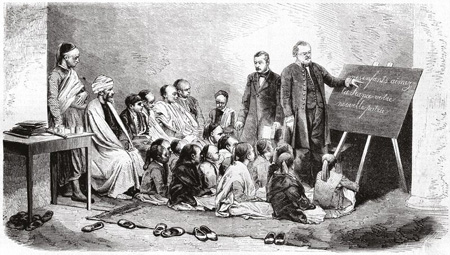Day 14 -- Colonialization
Alice L. Conklin, A Mission to
Civilize: The Republican Idea of Empire in France and West Africa, 1895-1930
(Stanford: Stanford University Press, 1997, pp.20-22.
 of intermarriage.
The earliest advocates. of a civilizing effort in the New World -- certain
colonial administrators -- had accepted racial mixing as one obvious means
to the behavioral changes they sought. This policy, although very different
from Napoleon's plan to reintroduce all of civilization to Egypt, was at
least as open-minded. Although colonial administrators had assumed that
barbarians had no civilization of their own, their recommendation to remedy
this situation through intermarriage meant that they were not overtly
racist. How widespread this attitude was, like so much else in Enlightenment
thought, remams subject to debate. What is clear is that sometime during the
first thirty years of French rule, c mm n a tors on Algeria be an to condemn
the concept of racial mixing and, by extension, the univiersal assumptions
that underwrote it. . . .
of intermarriage.
The earliest advocates. of a civilizing effort in the New World -- certain
colonial administrators -- had accepted racial mixing as one obvious means
to the behavioral changes they sought. This policy, although very different
from Napoleon's plan to reintroduce all of civilization to Egypt, was at
least as open-minded. Although colonial administrators had assumed that
barbarians had no civilization of their own, their recommendation to remedy
this situation through intermarriage meant that they were not overtly
racist. How widespread this attitude was, like so much else in Enlightenment
thought, remams subject to debate. What is clear is that sometime during the
first thirty years of French rule, c mm n a tors on Algeria be an to condemn
the concept of racial mixing and, by extension, the univiersal assumptions
that underwrote it. . . .
Several painful experiences acquired in the
colonization of Algeria, along with the theory of biological racism and the
onset of French industrialization at home, had predisposed the French to
alter that ideology between 1830 and 1870. By 1837, when the scientific
commission was formed, the army had met fierce Algerian resistance. French
soldiers were also dying from malaria and other tropical diseases. Indeed,
in the hostile Algerian, environment one of the greatest problems was not
only defeating the local populations, but identifying the proper hygienic
measures and civil engineering techniques that would make .the country
healthy and profitable for future settlers. After fifteen years of
educational and health care efforts -- in which metropolitan schools and
medical techniques were adopted in the colony without modification – the
Frernch also discovered a stubborn refusal by most of their new sub jects
to embrace the gifts of Western culture and ·science so "generously"
proffered. These various forms of resistance made new scientific arguments
about the inherent inferiority of other races that much more believable.
Meanwhile, with the help of modern technology and medicine, it became clear
that the white race could adapt to hot climates without intermarriage to
acclimatized "natives." These crosscurrents subdued any residual enthusiasm
for offering all of civilization's achievements to the colonized. Instead,
French definitions of what it meant to be civilized began to shift to
reflect the latest European accomplishment: the mastery of nature through
technology and science.